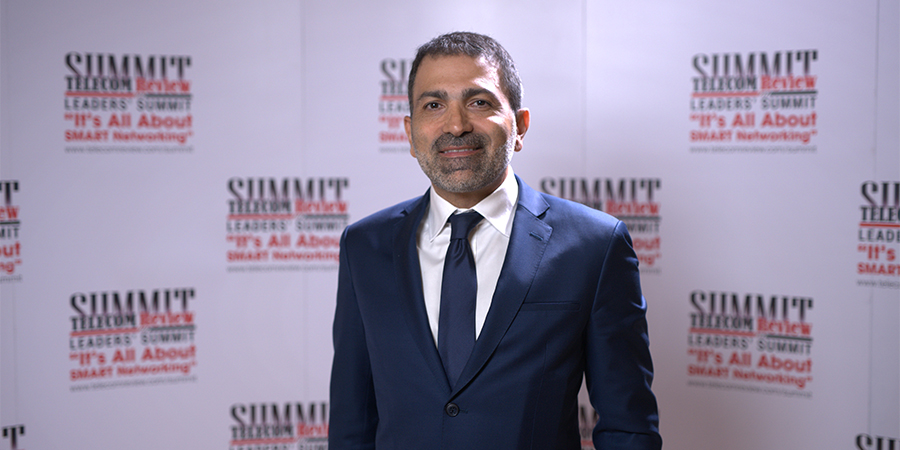During the 15th Telecom Review Leaders’ Summit held at the InterContinental Dubai Festival City, Telecom Review welcomed Elias Saab, chief commercial officer, Sofrecom Group, in person. In an exclusive interview, Saab shared the company’s position in helping telecom operators move towards being agile and digital as well as his views on the most relevant drivers that affect telcos’ in launching new services and improving customer experiences.
What can you say about the ongoing digital transformation and development of telcos to build a connected world?
The crisis has accelerated the need for digitalization in companies and governments. Digital technology is becoming a factor in economic recovery. General awareness is underway both at the level of decision-makers in public action and also in the private sector.
Moreover, the need for digital transformation is boosting the current market for consulting and engineering, and there is an international dynamic involving increased development of connectivity projects like broadband, fiber, and 5G as well as accelerated digitization of governments with numerous demands around electronic identification systems. Apart from that, the ongoing digitization of payments is also a factor of financial inclusion and development of the B2B sector in Africa, not to forget the creation of digital services for citizens such as e-health, e-education or e-agriculture.
Nevertheless, this acceleration generates new issues to be addressed such as data security, national data hosting strategy, or the internalization of certain services to guarantee business continuity.
Where is Sofrecom positioned in helping telecom operators move towards being agile and digital?
The constant evolution of technologies and the strong competition between players in the telco sector push operators to seek a continuous improvement of their operational performance by capitalizing on the power of digital. This improves their internal processes, adapts their organizations, and digitalizes the relationship with customers. At the same time, the crisis has given rise to new employee expectations in terms of teleworking and simplification.
Faced with these increasingly complex environments, the accelerating pace of innovation, and the demands of customers and employees, companies must develop their adaptability and responsiveness. They must be able to mobilize collective intelligence to create value in a continuous and iterative way, with a saving of means and energy, and by creating the conditions for the development of their teams.
We help our customers to meet these challenges and to lead their digital transformations by capitalizing on agile methods. For this matter, our experts and certified agile coaches are involved in four key areas: agile training, agile coaching, agile delivery, and finally, agile transformation. Our approach is based on transversal and complementary areas of intervention, integrating product vision, agile development, and continuous improvement.
From a business perspective, what are the most relevant drivers that affect telcos in launching new services and improving customer experiences?
Multiple factors play a huge role in the survival of telcos in the coming years, including the evolution of needs and consumption habits; respect of personal data and data security; evolution of the regulatory framework; and increased competition.
While telecom operators are scaling up their efforts in terms of infrastructure, they need to better integrate the growth ambitions of the B2B sector and the expectations of their consumer customers. As 5G evolves, telecom operators must consider new services and revenue streams, as well as their overall customer experience. In the future, unlimited connectivity will become a necessity for telecom operators, and technologies such as AI-powered smart homes integrated with IoT, will need to be included.
Additionally, the expansion of 5G and Wi-Fi networks will provide connectivity in the most remote areas. This will foster better opportunities for growth and expansion for the B2B sector, for consumers, as well as for governments. Homeworking, manufacturing, e-health, and education will likely benefit greatly from this telecom trend.
Nevertheless, being more than a telecom trend, customer experience is a great brand equalizer. Beyond the relationship with a telco operator, how a brand presents itself, what it stands for, and how serious it is about protecting their personal data, are all factors that will influence loyalty.
Every interaction with a brand counts when it comes to the overall perception of a company. From a customer's perspective, if they have a bad experience with customer service, they don't care if it's because you couldn't access their full customer profile, they only care that your brand didn't or couldn't help them.
Customer satisfaction has always been important to the growth of any business, but in the age of 24/7 connectivity, it's more important than ever. Consumers expect a lot from brands. Hence, service must be part of every step of their journey, from research to post-purchase and beyond. More than price and the product itself, service is the number one driver of customer loyalty.
From 2022 onwards, how would Sofrecom continue to deliver unique expertise in telecoms across the entire value chain — business, IT, and networks?
The economic recovery implies numerous transformation projects for our operators and government customers in order to manage the recovery while improving their operational performance. Thus, our first ambition is to continue to be the trusted partner of our customers to provide them with the necessary support for recovery by taking into account technological contributions such as 5G, big data, AI, and edge computing. In parallel, new challenges in terms of societal commitment for inclusion and reduction of their carbon footprint are dealt with.
For our government customers, in addition to the deployment of national digital strategies or the development of e-government strategies, we are expanding our portfolio to address the challenges of developing connectivity in rural areas through hosting national data and developing financial inclusion initiatives.










